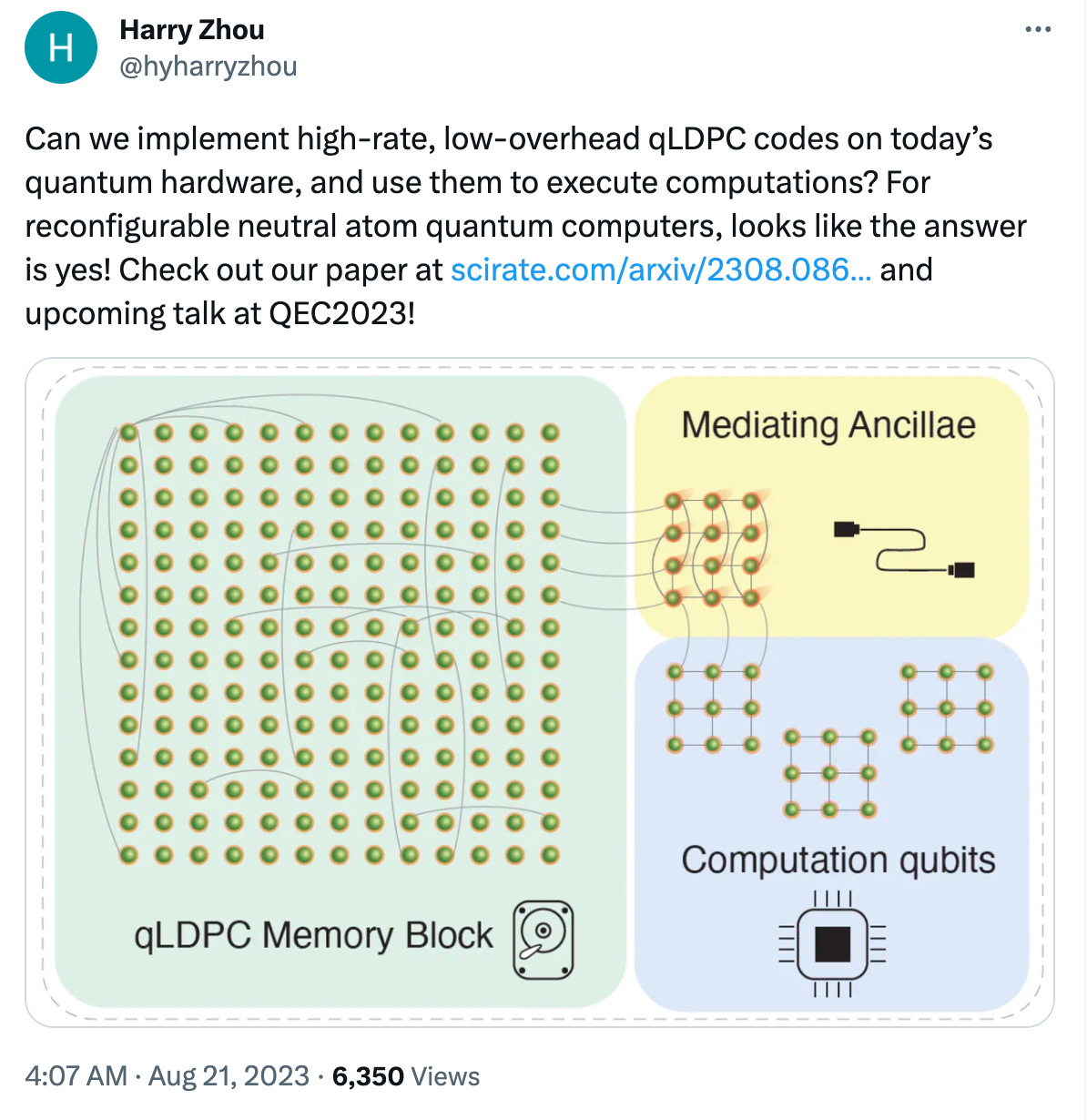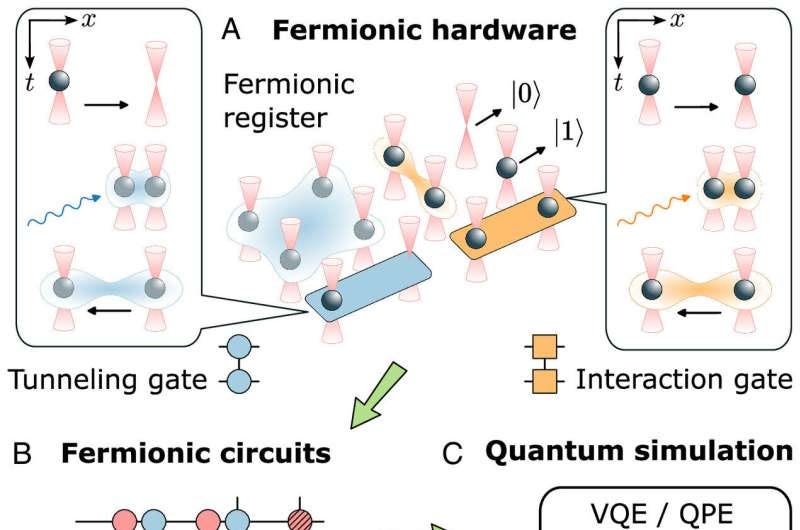The Week in Quantum Computing - August 28th
Issue #149
The Week in Quantum Computing. Brought to you by Sergio Gago (@piratecto).
Quick Recap
China's quantum computing advances are prominently featured this week, with the launch of China's largest quantum cloud computing platform by China Mobile and China Electronics Technology Group Corp. This platform signifies China's shift towards practical quantum computing, offering public quantum cloud services and open quantum fusion computing power testing environments for researchers and enterprises. Google has introduced a new algorithm that enhances the security of the FIDO2 industry standard, that would be quantum safe. Unitary Fund's $1.5M grant from the National Science Foundation demonstrates the growing support for open-source quantum projects and the push to foster an inclusive quantum ecosystem. This is part of a wider $38M program from the NSF. And in the UK the government created a fund of £30M to develop quantum computer hardware testbeds highlights the international drive to benchmark quantum technology advancements. Gero works towards quantum for health and aging processes.
NIST released a new RFC with 3 draft FIPS for Post Quantum Crypto. Hurry up, deadline is end of November!
Meanwhile, advancements in quantum hardware continue with researchers from QuEra proposing a novel scheme to perform fault-tolerant quantum computation using high-rate quantum low-density parity-check codes. Why is this important?
Quantum error correction (QEC) is believed to be essential for realizing large-scale fault-tolerant quantum information processing. However, traditional schemes for achieving quantum error correction, such as the paradigmatic surface code, are generally very costly in terms of resource overhead, requiring millions of qubits to solve problems of interest. qLDPC codes can significantly reduce the space overhead of fault-tolerant quantum computing, but the complex, long-range connectivity required can be hard to implement in near-term hardware. But what if you could move your qubits around? It turns out the way qubits are moved around in neutral atom quantum computers naturally matches the product structure of many qLDPC codes, enabling their hardware-efficient implementation. This can reduce the number of qubits needed to execute large-scale quantum computations by over an order of magnitude, bringing fault-tolerant quantum computing closer to reality.
In short, this brings:
- Fault Tolerance: The researchers demonstrate the fault tolerance of their protocols, showing the robustness of the system against potential errors.
- Efficiency: The qLDPC-based architecture can outperform the surface code with fewer physical qubits, making it a more resource-efficient approach.
- Practical Implications: This work opens up possibilities for low-overhead quantum computing with qLDPC codes, utilizing current experimental technologies.
Next Conferences
London:
Berlin:
The Week in Quantum Computing
China's largest quantum computing cloud platform unveiled
China Mobile and China Electronics Technology Group Corp launched on Saturday China's largest quantum computing cloud platform, the first system-level platform in the industry to achieve unified hybrid scheduling of quantum computing and general computing power.
The move proves that quantum computing in China is gradually moving toward a practical stage, China Mobile said in a statement. The platform was unveiled at 2023 China Computational Conference in Yinchuan, Ningxia Hui autonomous region.
China Mobile said it has taken the lead in providing public quantum computing cloud services, which links China Electronics Technology Group Corp's 20-qubit quantum computer, to provide an open quantum fusion computing power testing environment, which can provide strong support for universities, enterprises, and researchers to carry out quantum algorithm experiments.
Link: https://ift.tt/sTaMOoc
August 20, 2023 at 08:31PM
Google announces new algorithm that makes FIDO encryption safe from quantum computers
The FIDO2 industry standard adopted five years ago provides the most secure known way to log in to websites because it doesn’t rely on passwords and has the most secure form of built-in two-factor authentication.
Link: https://ift.tt/Ay6QOJI
August 20, 2023 at 10:30PM
Chinese AI firm DP Technology bags $100m in latest funding round
This is MonarQ, a universal quantum computer, one of just a handful operating across the globe, and one of two in Canada. In Bromont, a ski town less than 100 kilometres east of Montreal, another quantum computer is coming together, this one built by IBM.. VC funding in China’s AI sector reached $4.1 billion as of June 29, down 26.8% from its pre-pandemic level of $5.6 billion in the first half of 2020, according to Preqin data. In comparison, funding for AI firms in the US stood at $27.3 billion during the same period this year.
Link: https://ift.tt/ZceDvpg
August 21, 2023 at 02:31PM
China introduces largest quantum cloud computing platform, moves industry to practical stage
China Mobile on Saturday launched the largest quantum cloud computing platform in China along with China Electronics Technology Group Corp (CETGC), vowing to take quantum computing to a new level of practical use.
Link: https://ift.tt/0uCU6gD
August 21, 2023 at 06:31PM
Already a leader in AI, Quebec sets its sights on quantum computing
Quebec has invested nearly $200M in quantum computing over 7 years. In a grey industrial building in Dorval, a suburb on the island of Montreal, sitting among a sea of other grey industrial buildings, a team of physicists and engineers is tinkering with a machine that is expected to change the field of computing. This is MonarQ, a universal quantum computer, one of just a handful operating across the globe, and one of two in Canada. In Bromont, a ski town less than 100 kilometres east of Montreal, another quantum computer is coming together, this one built by IBM.
Link: https://ift.tt/LHM95l1
August 21, 2023 at 07:31PM
Unitary Fund is awarded a NSF grant to grow the quantum open source ecosystem
We are thrilled to announce that Unitary Fund has been awarded a $1.5M grant by the National Science Foundation (NSF) to grow the open-source ecosystem around the Mitiq project. This is a milestone for Unitary Fund, further establishing its impact as a new kind of research organization.
Link: https://ift.tt/qmAb3pa
August 21, 2023 at 10:33PM
Paper: Constant-Overhead Fault-Tolerant Quantum Computation with Reconfigurable Atom Arrays
Quantum low-density parity-check (qLDPC) codes can achieve high encoding rates and good code distance scaling, providing a promising route to low-overhead fault-tolerant quantum computing. However, the long-range connectivity required to implement such codes makes their physical realization challenging. Here, we propose a hardware-efficient scheme to perform fault-tolerant quantum computation with high-rate qLDPC codes on reconfigurable atom arrays, directly compatible with recently demonstrated experimental capabilities. Our approach utilizes the product structure inherent in many qLDPC codes to implement the non-local syndrome extraction circuit via atom rearrangement, resulting in effectively constant overhead in practically relevant regimes. We prove the fault tolerance of these protocols, perform circuit-level simulations of memory and logical operations with these codes, and find that our qLDPC-based architecture starts to outperform the surface code with as few as several hundred physical qubits at a realistic physical error rate of $10^{-3}$. We further find that less than 3000 physical qubits are sufficient to obtain over an order of magnitude qubit savings compared to the surface code, and quantum algorithms involving thousands of logical qubits can be performed using less than $10^5$ physical qubits. Our work paves the way for explorations of low-overhead quantum computing with qLDPC codes at a practical scale, based on current experimental technologies.
Link: https://ift.tt/jgrYcJu
August 22, 2023 at 08:30AM
Customer spend on quantum computing services has fallen but will grow, says IDC,
In the interim, customer spend for quantum computing has been negatively impacted by several factors, including: slower than expected advances in quantum hardware development, which have delayed potential return on investment; the emergence of other technologies such as generative AI, which are expe
Link: https://ift.tt/BGaC1DJ
August 22, 2023 at 09:33AM
Why was so much spent on quantum computers before they even existed? – Physics World
The first is the notion – strongly promoted by scientists and politicians alike – that the development of all technology follows a “natural course” and any nation that ignores this fact will endanger its global power and security. As Glickman describes in her dissertation, this narrative was used to push America’s development of semiconductors, which in the 1970s were said to be vital to keep the US ahead in the Cold War. Later, in the 1980s, they were needed to staunch the country’s decline relative to Japan, and in the 1990s it was to support encryption devices.
Link: https://ift.tt/2Nd9XFA
August 22, 2023 at 02:32PM
Gero Taps Quantum Computing and AI To Tackle Diseases Of Aging
In May, Gero (Scientific Reports, DOI: 10.1038/s41598-023-32703-4) as well as Insilico Medicine (Journal of Chemical Information and Modeling, DOI: 10.1021/acs.jcim.3c00562) published papers pointing to the drug discovery potential of quantum computing devices. A month later, SandboxAQ (an Alphabet company), announced the launch of its new drug-discovery AQBioSim division that will use artificial intelligence (AI) and quantum technologies for in silico simulation of molecular interactions.
Fedichev describes Gero as “experts in modeling human health and applying AI to find the signatures of aging and diseases.” It is not new to computer-aided drug discovery, he says, referencing the company’s most recent collaboration with New York University focused on finding molecules that may re-sensitize drug-resistant bacteria to known antibiotics (Science, DOI: 10.1126/science.abd8377).
Link: https://ift.tt/pPnNV7s
August 22, 2023 at 07:31PM
UK to benchmark quantum computer hardware
The UK government is funding a £30m programme to develop several quantum computer hardware testbeds for benchmarking the state of the technology. The...
Link: https://ift.tt/54TZI2L
August 23, 2023 at 10:32AM
Are we misinterpreting the impact of quantum computers?
What a marvelous machine the quantum computer! Gleaming pipes, lasers, microwaves, atoms, entanglement, paradoxes of quantum physics. And then crypto stuff, revolution, economic growth, eternal happiness. Why not? A climax generated by a mixture of science, exotic jargon, dreams, and fears. Not only this, but also recent injections of private equity and some alarming rhetoric fueled by expressions like "winning the quantum race" or "the quantum apocalypse is here."
Link: https://ift.tt/go0Q8Ew
August 23, 2023 at 12:33PM
National Science Foundation invests $38 million in quantum research
The National Science Foundation has allocated $38 million in fresh funding for research into quantum information science and engineering.
Link: https://ift.tt/bxtTosL
August 23, 2023 at 05:32PM
D-Wave Announces Increased Performance of Newest Quantum Hybrid Solver Available in the Leap Real-Time Quantum Cloud Service
To benchmark the performance enhancements made to the updated hybrid solver, D-Wave tested 2,045 binary quadratic problems, with the new CQM solver winning 80% of the problems, compared to 71.1% and 62.6% of previous versions. To learn more about the CQM hybrid solver and its most recent performance results, the technical report is available here.
Link: https://ift.tt/y4jgKZu
August 23, 2023 at 05:32PM
Post-Quantum Cryptography: CISA, NIST, and NSA Recommend How to Prepare Now
The National Security Agency (NSA), Cybersecurity and Infrastructure Security Agency (CISA), and National Institute of Standards and Technology (NIST) warned that cyber actors could target our nation’s most sensitive information now and leverage future quantum computing technology to break traditi
Link: https://ift.tt/5cFGLbr
August 24, 2023 at 08:30AM
Leading Quantum Physicists from Quantinuum and Chubu University Collaborate on Research into Quantum Artificial Intelligence and Cognition
Professor Bob Coecke and Professor Masanao Ozawa will lead a research team exploring applications of quantum theory to models of language, meaning and psychology – Quantinuum, the world’s largest quantum computing company, and Chubu University in Japan are pleased to announce a new and timely p
Link: https://ift.tt/WB5hKys
August 24, 2023 at 08:30AM
What is the next step after quantum computing?
Quantum computing is a new branch that is based on the principles of quantum mechanics. Are supercomputers that have the potential to solve complex problems or tasks that are impossible to do on a conventional PCsuch as code breaking, new material design, as well as process optimization.
Link: https://ift.tt/wlgZb8X
August 24, 2023 at 04:30PM
Comments Requested on Three Draft FIPS for Post-Quantum Cryptography August 24, 2023
These proposed standards specify key establishment and digital signature schemes that are designed to resist future attacks by quantum computers, which threaten the security of current standards.
FIPS 203, Module-Lattice-Based Key-Encapsulation Mechanism Standard
FIPS 205, Stateless Hash-Based Digital Signature Standard
The public comment period for these three drafts is open through November 22, 2023. See the publication details (linked above) to download the drafts and for information on submitting comments.
Link: https://ift.tt/XPrbHBQ
August 25, 2023 at 01:32AM
Scientists develop fermionic quantum processor
Researchers from Austria and the U.S. have designed a new type of quantum computer that uses fermionic atoms to simulate complex physical systems. The processor uses programmable neutral atom arrays and is capable of simulating fermionic models in a hardware-efficient manner using fermionic gates.
The team led by Peter Zoller demonstrated how the new quantum processor can efficiently simulate fermionic models from quantum chemistry and particle physics. The paper is published in the journal Proceedings of the National Academy of Sciences.
Link: https://ift.tt/TZWxiNR
August 25, 2023 at 09:32PM
Flying Cars Meet Quantum Computing
the commercialization of flying cars will introduce several challenges in determining the optimum flight path to save money and fuel while staying safe. Flight path calculation is a critical risk-management use case that needs to consider factors including the time, speed and route of the journey while satisfying airspace constraints and minimizing risks related to weather, obstacles and other aircraft. This risk-based, multifactor decision-making is an example of a real-world complex optimization problem ideally suited to certain types of quantum computing. Some organizations have already run trials on fleets of unmanned aerial vehicles, which face similar challenges.
Link: https://ift.tt/z4F1Nkv
August 26, 2023 at 10:32PM






